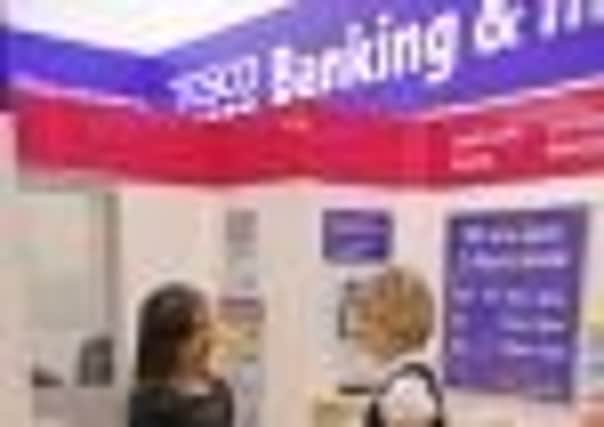Supermarkets stepping up challenge to high street banking giants


The launch of Asda Money is effectively the rebranding and upgrading of an operation that the supermarket has run for several years. Yet with the popularity of the big banking names eroding by the day, it was a timely move.
M&S, Sainsbury’s and Tesco already offer financial products including personal loans, savings and some savings accounts. Two of the three intend to launch into the current account and mortgage markets in the near future. While Tesco, headed by CEO Benny Higgins, has put its current account launch back until next year, M&S revealed last month that it is to offer an in-store banking service from this summer.
Advertisement
Hide AdAdvertisement
Hide AdSupermarket financial services isn’t a full step away from what’s already on the high street, however. The new Asda venture features products supplied by several mainstream providers, for example, while the M&S banking operation is a partnership with HSBC.
But experts still believe supermarkets could boost competition in the market.
Kevin Mountford, at MoneySupermarket, said: “The relaunch of Asda Finance as Asda Money adds another competitor to those challenging the big banks, and creates more competition for consumers.”
Rachel Springall, spokeswoman for Moneyfacts, said the Asda announcement was “great news” for customers.
“It will more than likely make Asda’s competitors sit up and take notice. Well-known for its value for money from the retail perspective, expanding its financial sector will be pleasing news to its loyal shoppers.”
Asda previously offered a credit card featuring interest-free purchases for three months and interest-free balance transfers for 12 months. That is being replaced with an Asda Money credit card that features 1 per cent unlimited cashback on Asda shopping and fuel and 0.5 per cent on purchases from other retailers. The cashback can be redeemed monthly and there’s no annual fee.
Unlike many cards, however, there’s no interest-free offer on purchases, only on balance transfers. Mountford said: “If you are using the Asda Credit Card to take advantage of the cashback, make sure you repay your balance in full every month, otherwise the interest charged will outweigh the money earned.”
It is also planning to dive into product areas including car insurance, home insurance, travel money and breakdown cover.
Advertisement
Hide AdAdvertisement
Hide AdBut how will those deals compare with the financial products already available in Britain’s supermarkets and elsewhere?
Are you better off sticking to traditional product providers or do supermarkets offer a genuine alternative?
It can vary between product, with supermarkets typically most competitive in the credit card and personal loan markets, where they tend to lead the best buy tables.
But it’s always worth shopping around, regardless of how attractive the deal promoted at the checkout may be. And try to look beyond the price, particularly on insurance products.
Adam Richards-Gray, spokesman for financial data analysts Defaqto, said: “All of these products are subject to regular re-pricing, such is their competitive nature, and so for consumers as ever it is important to refer to best-buy tables and pay attention to the terms and conditions of the products to ensure that they meet their needs.”
Here’s a look at three of the main product areas in which supermarkets compete with the financial services mainstream:
SAVINGS
M&S offers a variable-rate cash Isa paying 3 per cent and a fixed-rate savings bond at 3.75 per cent over three years.
It also has an everyday savings account with a variable rate of 2.35 per cent, according to Moneyfacts.
Advertisement
Hide AdAdvertisement
Hide AdTesco Bank, has a fixed-rate saver paying up to 3.6 per cent for three years; an internet savers at 2.8 per cent variable and an instant access account paying 1.25 per cent.
Sainsbury’s Bank promotes a fixed-rate saver paying up to 3.75 per cent for three years; an eSaver paying 2.7 per cent variable; another saver account paying 2.5 per cent variable and a 2.8 per cent variable cash Isa.
Best non-supermarket alternatives:
l Three-year fixed savings: Secure Trust Bank, 4.01 per cent
l No notice saver: Coventry Building Society telephone saver, 3.25 per cent
l Cash Isa: Santander direct Isa Issue Nine, 3.3 per cent
CREDIT CARDS
M&S has a conventional credit card with interest-free purchases for 15 months, with a rate of 15.9 per cent.
Tesco has two cards. One is for purchases, with an interest free-period of 16 months, plus a nine-month interest-free period for balance transfers.
There’s also a card aimed at balance transfers, boasting an interest-free period of 18 months, plus three months interest-free on purchases. Both cards have a rate of 16.9 per cent. The widest range of cards is offered by Sainsbury’s Bank, Moneyfacts tables show. It includes the 6.9 per cent APR Lowrate card and the Nectar card, with interest-free purchases for six months and balance transfers for 15 months and a rate of 16.9 per cent APR.
There’s also the Sainsbury’s Bank Gold card, which costs £5 a month but has free worldwide travel insurance, free foreign usage and a rate of 20.1 per cent APR.
Advertisement
Hide AdAdvertisement
Hide AdAsda has entered this market with the Money credit cashback card, as above.
Best non-supermarket alternatives:
l Low standard rate: Barclaycard Platinum Simplicity Visa, 7.9 per cent APR
l Introductory purchase: RBS YourPoints World Purchase MasterCard, 18 months interest-free
l Introductory balance transfer: Barclaycard Platinum Extended Balance Transfer Visa ,22 months interest-free, 1.45 per cent
PERSONAL LOANS
Supermarkets have come close to dominating the personal loans best buy tables in recent times and remain among the cheapest options.
M&S Money, Tesco Bank and Sainsbury’s Bank all have a rate of as little as 6 per cent for loans of £7,500 to £15,000 over five years,
l Best non-supermarket alternative: Derbyshire Building Society, 5.9 per cent (five year loan between £7,500 and £15,000)